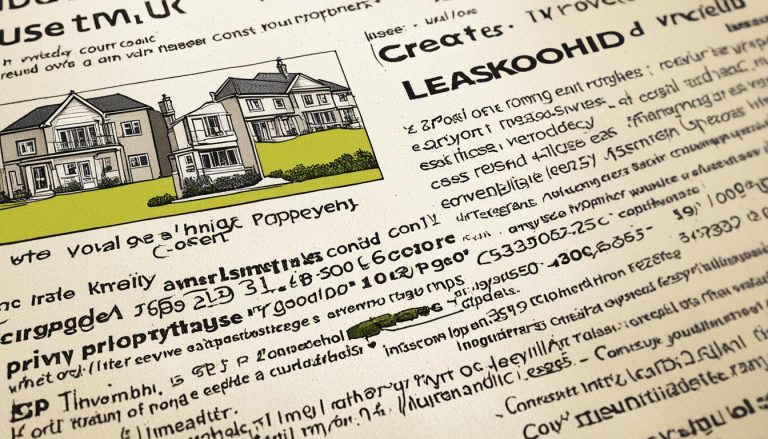Ground rent has long been a topic of concern for leaseholders in the UK. Many have been eagerly waiting for the abolition of this controversial charge that has burdened them financially. So, when can we expect ground rent to be eliminated?
In this article, we will delve into the current status of ground rent in the UK and when will ground rent be abolished and also explore the proposed timelines and plans for its abolition. We will examine the reasons behind the push for ground rent removal and the potential impact it may have on leaseholders.
Understanding ground rent
In the realm of property ownership, ground rent holds its ground as a significant consideration for many leaseholders. But what exactly is ground rent, and how does it impact those who hold leasehold properties?
Ground rent refers to the regular payment made by leaseholders to the freeholder or landlord for the use of the land on which their property stands. It is a long-standing practice in the UK and has been an integral part of leasehold agreements for many years.
The traditional method of charging ground rent involves a fixed annual fee that leaseholders are obligated to pay to the freeholder or their agent. This fee can vary depending on factors such as the property’s location, size, and lease terms. Ground rent fees are typically set out in the lease agreement and are subject to periodic reviews or increases, often linked to inflation or other predetermined parameters.
However, ground rent has attracted its fair share of concerns and controversies over time. Critics argue that the practice can be exploitative, with leaseholders facing unpredictable and escalatory charges. This has led to discussions about the need for ground rent reform and even complete abolition.
The future of ground rent is a topic of much debate, with efforts underway to reshape the system and address its perceived flaws. Various ground rent removal plans have been proposed, focusing on eliminating or substantially reducing ground rent charges to create a fairer and more transparent leasehold system.
Looking ahead, the potential implications of ground rent reform or abolition are substantial. Changes to ground rent regulations could affect the financial dynamics of leasehold properties and alter the power dynamics between leaseholders and freeholders. How these changes unfold and their impact on the property market remain key points of interest for property owners, industry experts, and policymakers.

As we move forward, it is essential to explore the complexities and considerations surrounding ground rent. By understanding its history, controversies, and the potential for change, we can navigate the ever-evolving landscape of leasehold property ownership with clarity and confidence.
The case for abolishing ground rent
There is an increasing consensus among stakeholders in the UK that ground rent should be abolished. This section will explore the rationale behind this sentiment and highlight the arguments put forth by various proponents of ground rent abolition.
The unfair burden of ground rent
One of the key reasons for advocating the elimination of ground rent is the perceived inequity of this property charge. Ground rent, traditionally paid by leaseholders to the freeholder, is seen as an unfair financial burden that grows over time. Critics argue that leaseholders should not be subjected to ongoing rental payments for a property they own.
Furthermore, ground rent charges have been known to increase exponentially over the lease tenure, potentially causing financial strain and jeopardizing the affordability of homeownership. This aspect is particularly concerning for those with long leases or lease extensions, as the cumulative impact of ground rent can be significant.
Potential timeline for ground rent abolition
While there is no definitive timeline for the abolition of ground rent, there have been promising developments that indicate progress in this direction. The UK government has expressed a commitment to addressing the issue and exploring potential solutions.
Significantly, in January 2021, the Law Commission published a report recommending reforms to leasehold law, including the abolition of ground rent. This indicates a clear intention to tackle the problem and suggests that legislative changes may be on the horizon.
Steps towards ground rent abolition
Several initiatives have been proposed to pave the way for the abolition of ground rent. One such proposal is the introduction of a new model called “commonhold,” which aims to replace leasehold with a system that allows property owners to collectively manage the shared aspects of their building.
The commonhold model, if implemented, could provide an alternative to leasehold and eliminate the need for ground rent. It offers greater transparency and control to property owners, ensuring that they have a direct say in the management and maintenance of their shared spaces.
It is important to note that the transition from leasehold to this new model would require careful consideration and planning to address any potential challenges that may arise during the implementation process.
Overall, the case for abolishing ground rent in the UK is gaining traction. With the government’s commitment to addressing this issue and the proposed reforms put forth by the Law Commission, there is hope that ground rent abolition will become a reality in the near future.

| Pros of ground rent abolition | Cons of ground rent abolition |
|---|---|
| 1. Greater affordability for leaseholders. | 1. Potential impact on property developers’ revenue streams. |
| 2. Reduction in financial burden on leaseholders. | 2. Need for alternative sources of revenue for property maintenance. |
| 3. Increased transparency and control for property owners. | 3. Potential challenges in transitioning to a new property ownership model. |
| 4. Equal ownership rights for leaseholders. | 4. Impact on property valuation and the housing market. |
Impact on leaseholders
With the imminent end of ground rent, leaseholders in the UK are poised to experience significant changes in their financial situations and property ownership rights. The elimination of ground rent charges will have far-reaching implications that warrant careful consideration and preparation.
Financial Implications
One of the primary impacts of ground rent abolition is the potential financial relief it brings to leaseholders. Ground rent, which is a recurring fee paid to the freeholder, can be a substantial burden on homeowners, especially when combined with service charges and other property-related expenses.
The end of ground rent means that leaseholders will no longer have to allocate a portion of their income towards this ongoing cost. This additional discretionary income may allow them to increase their savings, make home improvements, or invest in other ventures that contribute to their financial stability and well-being.
Property Ownership Rights
The abolition of ground rent also brings about changes in leaseholders’ property ownership rights. With the end of ground rent, leaseholders may experience a greater sense of security and control over their homes.
Previously, ground rent charges could introduce the possibility of escalating fees or other unfavorable terms that could impact a leaseholder’s ability to maintain or sell their property. The removal of ground rent helps to eliminate these concerns, providing leaseholders with greater autonomy and peace of mind when it comes to their properties.
Challenges and Concerns
While the end of ground rent is generally positive news for leaseholders, it is essential to acknowledge potential challenges and concerns that may arise during this transition. Some key considerations include:
- Contractual agreements: Ensuring that existing lease agreements are modified or updated to reflect the ground rent abolition.
- Property valuation: Properly assessing the impact of ground rent removal on property valuations and potential implications for mortgage financing.
- Legal complexities: Addressing any legal intricacies that may arise during the process of ground rent abolition, such as disputes or conflicts between leaseholders and freeholders.
These challenges highlight the need for proactive communication between leaseholders, freeholders, and other relevant stakeholders to navigate the transition smoothly and ensure a fair and equitable outcome for all parties involved.
Government initiatives and consultations
The ground rent abolition date has been a hot topic of discussion in recent months, as the future of property charges hangs in the balance. The UK government has recognized the need to address the concerns surrounding ground rent and has taken steps towards finding a solution that benefits leaseholders.
Several government initiatives and consultations have been launched to explore the feasibility of abolishing ground rent and to gather input from relevant stakeholders. These efforts aim to develop comprehensive legislation or policies that address the issue and provide clarity on the timeline for ground rent abolition.
Consultations have been conducted with various industry experts, leaseholder associations, property developers, and legal professionals to gather insights and opinions on the matter. These consultations are essential for ensuring that any future policies or legislation take into account the diverse perspectives and interests of all stakeholders.
The government’s commitment to engaging with stakeholders through consultations demonstrates a sincere effort to understand the challenges faced by leaseholders and to find an equitable solution. It also indicates a commitment to establishing a clear timeline for the abolition of ground rent.
Potential Legislation and Policies
Proposed legislation and policies are being developed based on the valuable input gathered from the consultations. These initiatives aim to address the concerns surrounding ground rent and provide a roadmap for its abolition.
While the specific details of the proposed legislation or policies are yet to be finalized, they are expected to include provisions that gradually phase out ground rent charges or completely eliminate them. The government is keen on ensuring a fair and transparent transition that balances the interests of both leaseholders and property developers.
Importantly, the government recognizes that the future of property charges goes beyond abolishing ground rent. It is actively exploring alternative models or approaches to replace ground rent, considering the long-term sustainability and fair treatment of leaseholders.
Promoting Transparency and Certainty
In addition to formulating legislation or policies, the government aims to promote transparency and certainty in the property market. This includes ensuring that leaseholders are well-informed about their rights, obligations, and any changes resulting from ground rent abolition.
The government understands the need to provide clarity on timeframes, potential financial implications, and any adjustments that may be required during the transition period. By doing so, leaseholders can make informed decisions and plan for the future accordingly.
Ultimately, the government initiatives and consultations are significant steps towards the abolition of ground rent and the future of property charges in the UK. These efforts reflect a commitment to fair treatment, transparency, and long-term sustainability in the property market.
Developer responses and obligations
As the calls for ground rent abolition gain momentum, property developers are facing increasing pressure to address this issue. They have certain obligations and responsibilities in this process and are taking steps to respond to the concerns of leaseholders and stakeholders.
Developer Obligations
Property developers play a crucial role in the ground rent system, as they are the ones who set the terms and conditions for leasehold properties. With the growing demand for ground rent removal plans, developers are realizing the need to reevaluate their approach and consider the impact on leaseholders.
Some of the key obligations that developers are expected to fulfill include:
- Ensuring transparency in ground rent charges during the sales process
- Providing clear information about the terms and conditions of leasehold agreements
- Taking into account the long-term financial implications for leaseholders
- Being responsive to leaseholder concerns and grievances
By fulfilling these obligations, developers can demonstrate their commitment to addressing the concerns surrounding ground rent and contribute to a fairer system for leaseholders.
Steps Taken by Developers
Many developers have already taken proactive measures to address the ground rent issue and respond to the growing demand for abolition. These steps include:
- Offering leaseholders the opportunity to convert their ground rent contracts to peppercorn rents or implement other alternative models
- Renegotiating lease terms to reduce the financial burden on leaseholders
- Supporting leaseholders in exploring options to buy the freehold of their properties
- Engaging in discussions with industry stakeholders to develop best practices for leasehold property sales
While these initiatives vary across developers, they reflect a recognition of the need to address the concerns surrounding ground rent and take steps towards its abolition.

Comparative Analysis: Developer Responses
| Developer | Response |
|---|---|
| Developer A | Offered leaseholders the option to convert ground rent contracts to peppercorn rents. |
| Developer B | Renegotiated lease terms to reduce ground rent charges for leaseholders. |
| Developer C | Supported leaseholders in purchasing the freehold of their properties. |
| Developer D | Engaged in industry discussions to develop best practices for leasehold property sales. |
As seen from the comparative analysis above, developers are taking different approaches to address the ground rent issue. This diversity in responses reflects the evolving nature of the discussion and the varying priorities of different developers.
Overall, it is encouraging to see developers acknowledging their responsibilities and taking steps to address the concerns surrounding ground rent. These efforts contribute to creating a more equitable system for leaseholders and demonstrate a commitment to the future abolition of ground rent charges.
Alternatives to ground rent
While ground rent has been a long-standing practice in the UK, there is increasing interest in exploring alternative models that can provide a fairer system for leaseholders. In this section, we will discuss some potential solutions and approaches that could be implemented in lieu of ground rent.
1. Leasehold Reform
One alternative to ground rent is leasehold reform, which aims to address the concerns and issues associated with traditional leasehold arrangements. This could involve introducing a cap on ground rent charges or transitioning to a system where leaseholders have more control over the management and maintenance of their properties. By reforming the leasehold system, we can create a more equitable and transparent approach to property ownership.
2. Commonhold
Commonhold is another model that could replace ground rent in the UK. Commonhold allows residents to collectively own the freehold of a property and have a say in its management and decision-making. This eliminates the need for ground rent payments and provides leaseholders with greater control and shared responsibility for the upkeep of the property.
3. Fixed Fee Arrangements
Fixed fee arrangements offer an alternative to ground rent by replacing it with a one-time payment or a fixed annual fee. This ensures that leaseholders have certainty and can budget for their housing costs without the risk of escalating ground rent charges. Fixed fee arrangements provide stability and eliminate the potential for onerous financial burdens on leaseholders.
4. Government-Backed Initiatives
The government may also play a role in developing initiatives that aim to replace ground rent with more tenant-friendly schemes. This could include providing financial support or incentives for property developers to adopt alternative payment models that are fairer to leaseholders. By encouraging innovation and investment in affordable and sustainable housing, the government can contribute to the elimination of ground rent.
By exploring and implementing these alternative models and approaches, we can move towards a future where ground rent is no longer a burden for leaseholders in the UK. As we transition away from traditional leasehold practices, it is important to consider the timeline for ground rent abolition and ensure that the rights and interests of leaseholders are protected throughout the process.
| Alternative Model | Features | Benefits |
|---|---|---|
| Leasehold Reform | Cap on ground rent charges Greater control for leaseholders over property management |
More equitable and transparent system Reduced financial burden on leaseholders |
| Commonhold | Collective ownership of freehold Shared responsibility for property management |
No ground rent payments Increased control and decision-making power for leaseholders |
| Fixed Fee Arrangements | One-time payment or fixed annual fee Stable housing costs |
Certainty for leaseholders No risk of escalating ground rent charges |
| Government-Backed Initiatives | Financial support for property developers Incentives for alternative payment models |
Encourages adoption of fairer schemes Contributes to ground rent elimination |
Implementing alternative models to ground rent requires careful consideration and collaboration between stakeholders, including leaseholders, property developers, and the government. By embracing these alternatives, we can create a more sustainable and equitable housing market for all.
Potential challenges and considerations
As the ground rent abolition date approaches, there are various challenges and considerations that need to be addressed and overcome to ensure a smooth transition. These challenges encompass legal, financial, and practical aspects, which may impact the timeline for eliminating ground rent charges.
Legal hurdles to overcome
One of the primary challenges lies in the legal framework surrounding ground rent abolition. Legislation and regulations need to be carefully reviewed and amended to facilitate the removal of ground rent charges. This process may require extensive consultations and revisions to ensure that the rights of all parties involved are protected.
Financial implications
The elimination of ground rent will have financial implications for both leaseholders and property developers. Leaseholders may face potential increases in service charges or other associated costs to compensate for the loss of ground rent income. On the other hand, developers may need to find alternative revenue sources or adjust their business models to adapt to the new landscape.
Practical obstacles
The practical implementation of ground rent abolition poses its own set of challenges. Property management companies and other relevant stakeholders will need to update their systems and processes to accommodate the changes. This may involve renegotiating lease agreements, reevaluating property valuations, and finding ways to administer common expenses effectively.
| Challenges | Considerations |
|---|---|
| Legal framework | Careful review and amendment of legislation and regulations |
| Financial implications | Impact on leaseholders and developers |
| Practical implementation | Updating systems and processes |
| Public perception and awareness | Educating the public about the changes and benefits |
Despite these challenges, the potential benefits of ground rent abolition make it a worthwhile endeavor. It is crucial to address these considerations proactively and collaboratively to ensure a successful transition that benefits both leaseholders and the property market as a whole.
The future of property charges
As the ground rent abolition plans continue to gain momentum, the future of property charges in the UK is likely to undergo significant changes. With the potential removal of ground rent, alternative systems and models are expected to emerge, impacting leaseholders and the property market as a whole.
One possible alternative to ground rent is the implementation of a service charge-based system. In this model, leaseholders would contribute towards the maintenance and management of the property through service charges, rather than paying ground rent.
Another option could be the introduction of a commonhold ownership structure. Commonhold allows individual property owners to collectively manage their shared spaces and costs, providing more control and autonomy compared to leasehold arrangements.
Additionally, the use of peppercorn rent could be explored, where a nominal or symbolic rent is charged to signify the presence of a legal lease. This approach ensures that leaseholders retain ownership rights without the burden of significant financial obligations.
It is important to note that the timeline for ground rent abolition and the subsequent implementation of alternative property charge systems are subject to government legislation and industry agreements. Stakeholders, such as property developers, leaseholders, and policy-makers, need to collaborate and negotiate to ensure a smooth transition and a fair outcome for all parties involved.
The impact on leaseholders
Leaseholders will play a crucial role in shaping the future of property charges. They will need to consider the implications of alternative systems and actively participate in consultations and discussions with developers and industry organizations.
While the removal of ground rent may alleviate the financial burden for leaseholders, other charges may increase or change under new systems. Leaseholders should carefully analyze the potential benefits and drawbacks of different property charge models to make informed decisions about their future investments and living arrangements.
Furthermore, leaseholders should be proactive in seeking legal and financial advice to navigate the complexities of transitioning from ground rent to alternative property charges. Understanding their rights, obligations, and options will empower leaseholders to protect their interests and ensure a satisfactory outcome.
The role of developers and industry stakeholders
Property developers have an important responsibility in facilitating the transition to alternative property charge systems. They should actively engage with leaseholders, provide transparent information about the proposed changes, and address any concerns or queries that arise.
Developers can also proactively collaborate with government bodies, industry organizations, and legal experts to develop frameworks that facilitate the smooth implementation of alternative property charge models. This may involve establishing best practices, creating standardized agreements, and providing support and resources for leaseholders throughout the process.
Conclusion
In conclusion, the future of ground rent in the UK is uncertain. While there is a growing push for its abolition, with stakeholders highlighting the concerns and controversies surrounding it, there are still challenges and considerations that need to be addressed. The government has initiated consultations and proposed legislation aimed at addressing this issue, but the timeline for ground rent abolition remains unclear.
The impact on leaseholders cannot be overlooked. As ground rent is potentially eliminated, it may have financial implications for them and could affect their rights as property owners. It is crucial for leaseholders to stay informed throughout this process and seek guidance from legal and financial professionals to navigate any potential challenges that may arise.
Looking ahead, alternative models and approaches to property charges may emerge as a substitute for ground rent. These alternatives could provide a fairer system for leaseholders and alleviate their concerns. However, it is important to carefully consider the implications of these new models and the potential impact they may have on the property market as a whole.
In conclusion, while ground rent abolition in the UK seems imminent, it is essential for all parties involved, including leaseholders and developers, to actively engage in discussions and contribute to the ongoing dialogue. By coming together and finding common ground, we can shape the future of property charges in a way that benefits everyone and ensures a fair and sustainable system.
FAQ
When will ground rent be abolished in the UK?
There is currently no exact date for the abolition of ground rent in the UK. The government is considering proposals to reform leasehold laws and mitigate the impact of ground rent charges, but the timeline for implementation is uncertain.
What is ground rent?
Ground rent is a fee payable by leaseholders to the freeholder or landowner for the use of the land on which their property is built. It is typically a fixed amount paid annually or semi-annually.
Why is there a push to abolish ground rent?
The push to eliminate ground rent stems from concerns over the financial burden it places on leaseholders and potential unfairness in its collection. Ground rent abolition aims to create a fairer and more transparent system for property ownership.
What could be the impact of ground rent abolition on leaseholders?
Abolishing ground rent could potentially alleviate the financial burden on leaseholders, as they would no longer have to pay regular fees to the freeholder. It may also give leaseholders greater control over their property and more certainty about future costs.
Are there any government initiatives or consultations regarding ground rent abolition?
Yes, the government has initiated consultations and is considering legislative changes to reform leasehold laws. These consultations aim to gather stakeholders’ views and inform future policies relating to ground rent and leasehold reform.
How are property developers responding to the calls for ground rent abolition?
Property developers are increasingly being urged to address the ground rent issue. Some have voluntarily proposed plans to remove ground rent from new leasehold properties, while others are exploring alternative models that do not rely on ground rent.
What are the alternatives to ground rent?
There are several alternatives to ground rent that have been proposed. These include commonhold ownership, where the property is collectively owned and managed by the residents, and leasehold reform that involves fairer and more transparent charges.
What are some potential challenges and considerations in abolishing ground rent?
Some potential challenges include the need to address existing leases, ensuring fair compensation for freeholders, and finding alternative methods to fund the maintenance and management of shared spaces and facilities within leasehold properties.
What does the future hold for property charges with the potential elimination of ground rent?
The potential elimination of ground rent could lead to a shift in the property charges landscape. Leasehold reforms and alternative ownership models may emerge to create a fairer and more sustainable system that benefits both leaseholders and freeholders.






